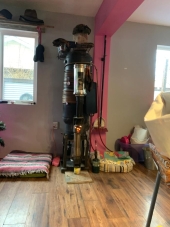
 1
1




Namaste! (the divine in me sees and honours the divine in you)
 1
1





 2
2




 1
1




Hi Michelle,Michelle De Long wrote:Hello everyone. I am trying to discern if anyone has experience to share regarding converting a furnace that uses oil to heat a boiler that pushes hot water through old radiators. I love my cast iron radiators and the radiant heat. I'm up in the Apalacian mountains of the East coast of Canada and winters here are long and bitter. However, this sucker ran me about 700 per 6 weeks BEFORE the prices went up last year. I've a 3000 sq ft home that's brick and siding, could be insulated better, but has good windows and I close rooms off that I'm not using and don't heat 2 bedrooms. I want to determine if I can retrofit or convert the boiler / furnace to run on any type of cheaper, more sustainable fuel. Everyone here is converting to electric or wood. I'm getting a supplementary wood stove insert but it's not a full tine plan, as we need to travel a bit and can't have frozen pipes when I can't feed the fire. I prefer to stay away from electric as I've zero confidence that it won't sky rocket as demand increases and there is a new monopoly to profit from. I also can't use electric for the radiant heaters as it doesn't burn hot enough to heat the boiler efficiently. It would be forced air and that's all kinds of horrible for health.
Anyone know of anything like this? I keep thinking back to the future - there has got to be a different fuel that can be used for this type of furnace that's cleaner and cheaper. Thanks all!




Douglas Alpenstock wrote:Hi Michelle. Yeah, costs have gone crazy. Ouch.
Fuel oil is a tough fuel to replicate in a way you could reasonably trust whilst away. It's sort of in the kerosene-diesel zone, with additives to prevent corrosion, gelling in extreme cold, degradation, clogging etc. Quite the witches' brew, phew.
It is possible to winterize, such as is done for seasonal cabins, where all the water lines are blown out with compressed air and the sewer traps are fortified with substances that will not freeze into a destructive, expanding plug. It can be done, but I wonder what would protect your cast iron radiators from catastrophic damage.
Sorry, no easy solutions that I can see right off, outside of someone staying on site while you are away.
Namaste! (the divine in me sees and honours the divine in you)




William Bronson wrote: A wood pellet burning boiler might fit your needs.
You would still be dependent on an outside source of fuel, but it is at least not fossil fuel.
Outdoor wood boilers allow you to use less refined fuel, but also tend to be burned in the dirtiest way possible, specifically to stretch the times between tending.
They still need to be fed everyday.
Your house sounds large, do you have a basement?
If so, a wood fired boiler that could feed a huge hot water storage could be ideal.
You could run the boiler wide open to get the cleanest most efficient burn possible while capturing the heat in the hot water storage.
That storage would be there to keep the house above freezing while you are away.
Indoor and outdoor wood fired boilers are common, large amounts of storage , less so, but:here is one example of a commercial thermal mass product.
Namaste! (the divine in me sees and honours the divine in you)

|
eat bricks! HA! And here's another one! And a tiny ad!
The new permaculture playing cards kickstarter is now live!
https://www.kickstarter.com/projects/paulwheaton/garden-cards
|









